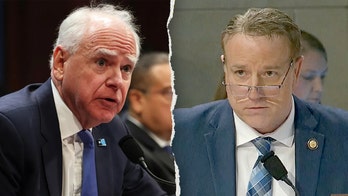
President Barack Obama pauses as he speaks on America's Great Outdoors initiative during a ceremony in the East Room of the White House in Washington, Wednesday, Feb. 16, 2011. (AP)
Faced with criticisms over its muddled response to the popular uprisings in Egypt and Tunisia, the White House has revealed that President Obama last August ordered a secret report that concluded that without sweeping political reform, the Middle East and North Africa were ripe for revolution.
For several months, the White House held weekly interagency meetings examining questions of political reform across the region, a senior administration official confirmed to Fox News.
"That process has helped us respond quickly and effectively to the events in Tunisia and Egypt, and will help guide our regional focus on encouraging governments in the region to take on meaningful political reforms going forward," the official told Fox News.
The New York Times first reported on the existence of an 18-page classified report that identified likely flashpoints of potential unrest, including Egypt, and added another piece to the puzzle in efforts to assess, in retrospect, how well top policymakers were served by the intelligence community in the months preceding the revolutions in the Middle East.
According to the administration official, at that time the "presidential study directive" was ordered, Obama observed that there are risks to the status quo, just as there are risks to pursuing alternative policies. But, the official said, "continued support for increasingly unpopular and repressive regimes may pose long-term risks to regional stability and our interests."
But even as the administration was supposedly studying stability risks in places like Egypt, the U.S. intelligence community was mostly in the dark about the festering situation in Egypt.
National Intelligence Director James Clapper told a Senate Intelligence Committee on Wednesday that U.S. intelligence agencies lacked information about the agenda of the country's radical Islamists.
"Specific triggers for how and when instability would lead to the collapse of various regimes cannot always be known or predicted," Clapper said in the hearing. "What intelligence can do in such cases is reduce, but certainly not completely eliminate, uncertainty for decision-makers. But we are not clairvoyant."
Clapper and CIA Director Leon Panetta faced criticism from lawmakers who said the agencies' reports sometimes shed less light than media coverage.
Clapper acknowledged that the abilities of the intelligence community is limited.
"We're not like Sherman Williams paint. We don't cover the earth equally," he said. "So frankly Tunisia was probably not up there on our top 10 countries that we were watching closely. Obviously we are going to work on that."
The White House struggled to find the right response to the 18-day uprising in Egypt that toppled longtime leader Hosni Mubarak. The White House tried to balance its support for a pro-democracy movement with its fear of a new power hostile to Israel and the U.S. in a vacuum created by Mubarak's swift departure.
The State Department confirmed Wednesday that all the information streaming into the National Security Council hardly brought unanimity to the president's top advisers.
"There's one foreign policy in of the United States…and in the day-to-day interaction, whether it's in deputies' committees or in principals' committee, you know, there were different views on how to accomplish certain things," State Department spokesman P.J. Crowley said.











































